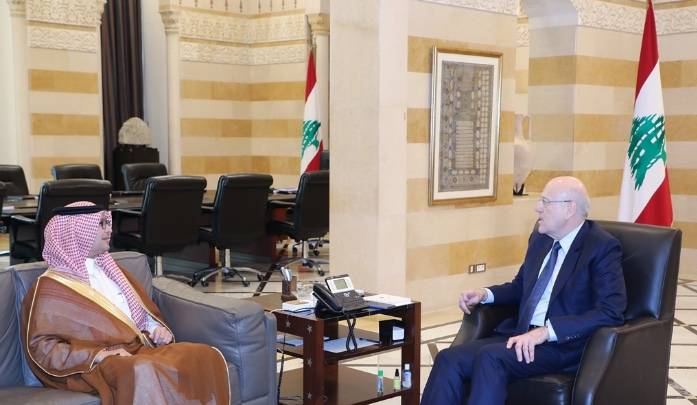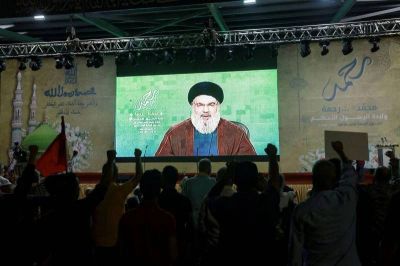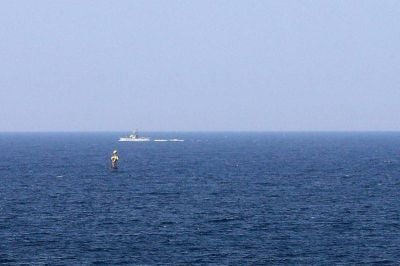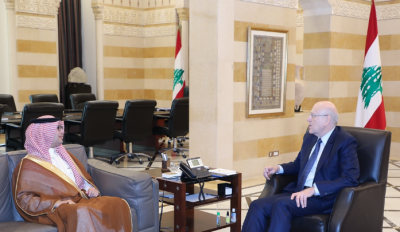
Prime Minister Najib Mikati speaks at the Grand Serail with Saudi Arabian Ambassador Walid Bukhari. (Credit: NNA)
Even in Lebanon, a country accustomed to foreign interference, Saudi Ambassador to Beirut Walid Bukhari’s remarks came as a surprise to many.
“The Taif Agreement is a binding contract to strengthen the foundations of a pluralistic Lebanon,” Bukhari announced via Twitter on Sunday.
The kingdom’s attachment to the agreement, which made a Sunni prime minister the central figure in Lebanon’s executive power structure, is well known.
Since its inception, the deal has been widely abused, particularly in recent years, notably by President Michel Aoun, a fierce detractor of the agreement.
But this is not enough to explain why the kingdom's ambassador was keen to reaffirm this red line so strongly.
Bukhari’s remarks give the impression that an existential threat might hang over the agreement.
While the Aounist camp and Hezbollah are not hiding their desire to amend the Constitution, no one dares to bluntly raise the subject in the public arena.
So, what provoked Bukhari?
The Saudi diplomat’s remark seems to reflect the current state of mind of the kingdom in relation to Lebanon.
Saudi Arabia is actually having a bad time in the Lebanese arena, having concerns that the situation is going in the opposite direction of the kingdom’s wishes.
“Riyadh takes a very dim view of the agreement between Lebanon and Israel on the maritime border,” an Arab diplomat, who requested anonymity, told L’Orient-Le Jour.
After a decade of dispute, Israel and Lebanon have reached an agreement on the delineation of their maritime border and are expected to officially sign the deal next week.
“For Saudi Arabia, this is an American-Iranian agreement that will strengthen Hezbollah and the Free Patriotic Movement in Lebanon,” the Arab diplomat added.
Aoun wanted at all costs to secure this agreement before the end of his term in office so he can be credited for this achievement.
Hezbollah, for its part, has remained officially on the sidelines of the negotiations, but no deal could have been reached without its green light.
Several allies of Saudi Arabia on the local scene confirmed to L’Orient-Le Jour, on condition of anonymity, Riyadh’s concerns.
This explains, according to them, Riyadh’s reaction to the Swiss initiative that aimed to bring together several Lebanese parties.
A dinner was scheduled for Oct. 18 at the Swiss Embassy in Beirut between MPs representing the main Lebanese political parties for “informal” discussions, a few weeks before a conference scheduled in November to discuss political reform.
The dinner was completely torpedoed by Riyadh, which reportedly interpreted it as a desire to call into question the Taif Agreement.
“Saudi Arabia was very upset by the timing of this announcement because it came after the maritime border demarcation and the election of a president in Iraq,” the Arab diplomat explained.
New Iraqi President Abdul Latif Rashid [who was elected on Oct. 13] is seen as close to the Iranian axis. His new prime minister, Mohammed Shia' Sabbar al-Sudani, is also close to Tehran.
The kingdom fears that the current sequence of events reflects a desire to make Iran — and by extension Hezbollah — the United States’ privileged interlocutor in the region.
The maritime agreement may in fact strengthen the weight of Hezbollah on the domestic scene and allow it to negotiate a new distribution of power from a position of strength.
Saudi Arabia has thus made a direct link between this agreement and the Swiss initiative, especially since Bern has been playing the role of intermediary between Iran and the US for years.
Hezbollah was actually an essential part in the Swiss initiative, with Ali Fayad reportedly representing the party on the guest list for the dinner.
‘Riyadh was in the loop’
According to a local political source involved in the Swiss initiative, the discussions were launched more than a year ago, with the aim of resuming dialogue between the different parties.
“Riyadh was in the loop,” the political source told L’Orient-Le Jour.
The dialogue was to focus on three main points: adherence to the Taif Agreement, Lebanon’s economic future and foreign policy.
In addition to the timing of the Swiss dinner, two other factors apparently pushed Riyadh and its local allies — the Lebanese Forces and the Progressive Socialist Party — to abort the Swiss initiative.
The first was that the Kataeb was not invited to the dinner.
“It was not possible to invite all the Christian forces. Inviting the Kataeb would have meant inviting the Marada Movement and Michel Moawad [independent MP for Zgharta] as well,” a Western diplomatic source, who was involved in organizing the event, told L’Orient-Le Jour
The second factor, which is of essence to Riyadh, was the fact that Sunni MPs were under-represented among the invitees.
In fact, only former Interior Minister Raya al-Hassan and Forces of Change MP for Beirut Ibrahim Mneimneh were invited.
Mneinmeh refused to participate in the Dar al-Fatwa initiative last month, which aimed to unite the Sunni ranks — a decision that dismayed the kingdom. Inviting him to represent the Sunni community at the Swiss dinner was the last straw for Riyadh.
But, according to the Western diplomat, “This is all a terrible misunderstanding. There was no desire to exclude Saudi Arabia.”
This article was originally published in French in L'Orient-Le Jour. Translation by Sahar Ghoussoub.


